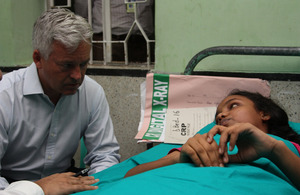UK to act on safety standards for workers in Bangladesh
Minister meets survivors of factory collapse; announces UK support to improve workers' conditions.

Development Minister Alan Duncan speaks with 19 year old Rabeya, a survivor of the Rana Plaza factory collapse in Bangladesh last month. Photo: Narayan Debnath/DFID Bangladesh.
International Development Minister Alan Duncan met today with survivors of last month’s Rana Plaza factory disaster in Bangladesh at a DFID-funded Centre for the Rehabilitation of the Paralysed in Savar. He spent time speaking with 19 year old Rabeya, who was working on the 8th floor of the building with her sister when the factory collapsed. Her sister escaped without major injuries, but Rabeya injured her spine and will be in a wheelchair for the rest of her life.
Rabeya told the Minister that despite everything that has happened to her, she feels lucky to be receiving treatment at the Centre, which is funded through DFID’s Rights and Governance Challenge Fund.
The Minister announced today that Britain will act to improve conditions for people like Rabeya. DFID will be funding initiatives that bring buyers, manufacturers, workers, NGOs and the government of Bangladesh together to agree a set of common standards for worker safety.
Existing UK funds will also be used to improve building safety inspections, including providing a team of UK specialists to review the building inspection system and there will be new UK support for a programme of skills training to 100,000 low-skilled garment and construction workers.
The Minister called on all buyers and suppliers in the ready-made garment industry to take action to improve working conditions and ensure worker safety.
His visit follows a letter to British companies in Bangladesh from Development Secretary Justine Greening, inviting them into the department to discuss how we can go further in raising standards in garment production.
Alan Duncan said:
I have been incredibly moved by the courage of the people I have met today, many of whom lay trapped for days and sustained appalling injuries.
The Rana Plaza factory collapse was devastating in its scale and, along with factory fires, must be taken as a wake-up call to all of us.
Safety and standards must be made to catch up with the rapid growth in the garment sector, which is a massive success story and must not be allowed to go sour.
The industry has been built from nothing in the past 30 years and now needs to be turned into a long-term development success, which means that urgent action is needed across the sector.
Our own high street brands must assume responsibility for their products, from the store right back to the sewing machine, and the UK is ready to help make this happen.
The minister used his visit to tour the Babylon factory which produces clothes for Tesco and other UK buyers and meet members of the garment industry’s buyers’ forum to discuss what could be done to address some of the fundamental problems. He also raised the issue at a meeting with Prime Minister Sheikh Hasina.
Related government links
- Find out how we support fair and ethical business around the world on our policy page.
- Find out how we work in Bangladesh through DFID Bangladesh and through the British High Commission in Bangladesh.